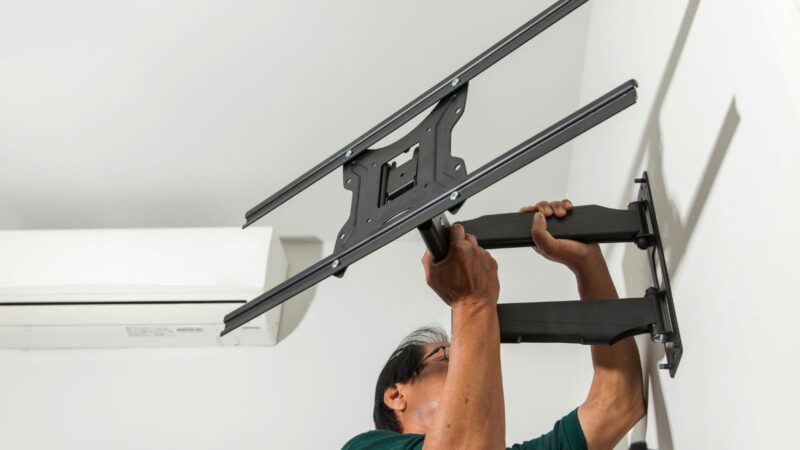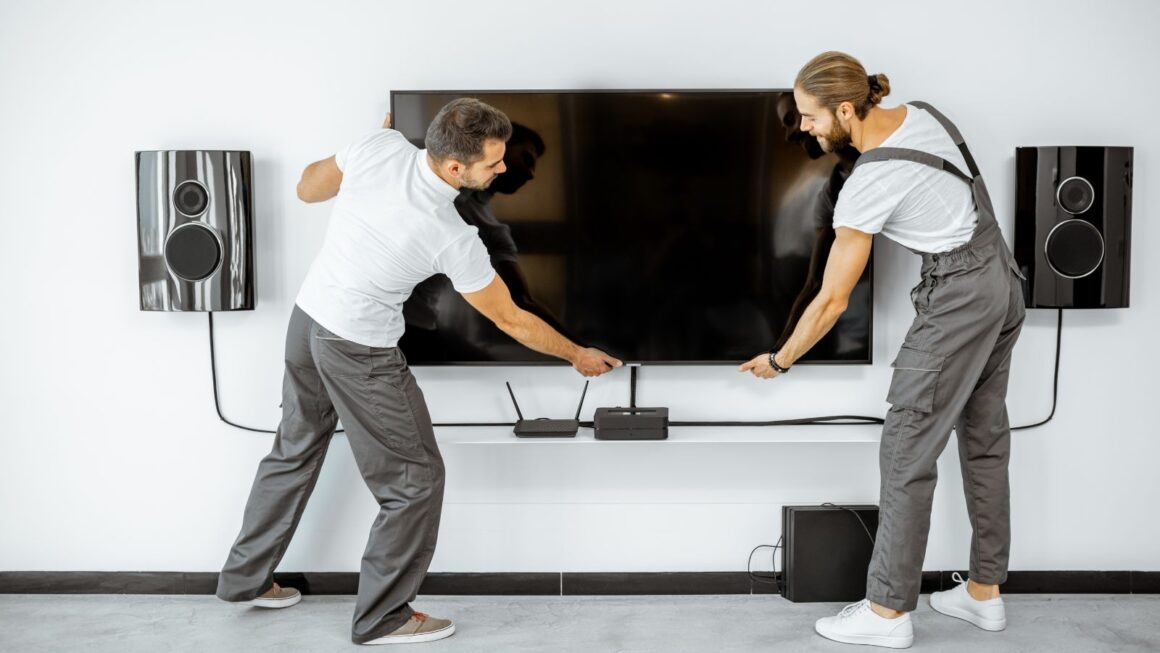When you install your TV, it’s not only about getting the best viewing angle or saving room. We should also consider if mounting a TV on the wall changes how well it receives signals. The place where your TV is located, how high it is, and what materials are around it can greatly affect the strength and quality of your signal, especially if you’re using an aerial for Freeview or other channels. How important is the mounting point for receiving signals? Let’s simplify it.
The Importance of TV Aerial Placement
Before we consider the TV mount, let’s talk about the antennas. Antenna placement is important for receiving a strong signal. If you’re using a TV aerial for good channels, where you put the aerial matters as much as where you put your TV. Putting your TV near or behind large metal things, like a metal stand or frame, can block the signal and cause bad reception. That’s why it’s important to make sure your TV antenna isn’t blocked.
A TV antenna on the roof or higher up usually gets a better signal than one inside the house or hidden behind furniture. If you’re thinking about how to mount your TV and how it might affect the signal strength, consider where the aerial is compared to the TV. TV aerial installers can help you find the best spot to place your antenna for better performance.
How Wall-Mounting Affects Signal Reception
You might be asking if putting your TV on the wall impacts the quality of the stream. The answer can change based on a few things. First, think about what kind of TV you own. Older TVs, like CRT (Cathode Ray Tube) types, can pick up more interference from walls, especially if they are placed against thick brick or concrete walls. The size and material of the wall behind your TV are important. Metal structures can block signals, which leads to weak or spotty coverage. Mounting a TV in a room with thin walls or less disturbance might help improve your signal.
If you place your TV on a wall with few obstacles and it’s in a good spot for the signal, you might get better coverage. If you have a TV mount that allows you to change the angle of the TV, adjusting it can help get better coverage. A flexible TV wall mount lets you angle the screen to improve signal reception, which can help if you’ve had weak signal issues before.
TV Aerial Placement Related to the Mount
Installing your TV on the wall might change how the aerial connects to it. If your TV aerial is near the TV, particularly close to the mount or behind the screen, you might have signal problems. TV aerials need room to receive the signal well. If your antenna is located behind the TV or too close to its innards, you may experience signal loss or interference.
It’s best to keep the antenna and the TV apart as much as you can. This helps minimise crosstalk between the two, ensuring a stronger signal. It’s usually best to use a separate, good-quality antenna that is placed in a spot where it can get the strongest signal without any interference from electronic devices or walls.
The Importance of Wall Materials
The kind of wall you put your TV on can impact how well it receives signals. For example, putting your TV on a rock wall might weaken the signal if the TV antenna isn’t positioned correctly.

Materials like concrete, metal, and thick plaster can absorb or deflect signals, making it harder for your aerial to record a strong signal. Wood or drywall surfaces usually won’t affect receiving if the antenna is placed correctly.
If you’re putting your TV on a metal wall or a very thick wall, make sure your antenna is placed away from any obstacles. TV aerial technicians can help you find the best place to put your aerial to avoid interference.
The Height at Which You Mount Your TV is Important
Another thing to think about when hanging your TV on the wall is the height. If you mount your TV too high, it can make watching it uncomfortable and may also affect the signal power. The higher you put your TV, the more likely it is to have issues with walls and ceilings, especially if your antenna isn’t in the best position. Remember that the taller your TV, the more likely it is to be blocked by things like furniture and walls.
The correct height for mounting can improve transmission. If you place the TV too high, it may receive a weak signal, especially if your antenna is in a poor location. If you’re not sure, asking an expert to fix your antenna can help you find the right height for your TV and antenna placement.
The Advantages of Using an Outdoor Aerial
If you’re getting a weak signal even though your aerial and TV are set up correctly, you might want to try using an outdoor antenna. Outdoor TV antennas usually work better than indoor ones, especially in places where the signal is weak. Outdoor antennas can receive messages from farther away and are less likely to be blocked by walls or other things in the house.
Putting a TV on an outside wall and adding a well-installed outdoor antenna can greatly enhance TV coverage. If you’re having trouble with weak TV signals and your aerial is inside, consider hiring a professional to place an outdoor aerial for better reception.
Interference from Other Electronics
You may not know it, but other electronic gadgets in your home could be interfering with your TV’s reception. Devices such as routers, portable speakers, and fluorescent lights can disrupt your signal. If your TV is close to any of these, you may get a weak signal. This is another reason why where you place your TV is important.
If your TV is too close to certain devices, it might cause annoying disruptions, even if your antenna is positioned correctly. Check where other electronic devices are in the room to make sure they aren’t causing reception problems.
Summary
Does putting up your TV change how well it receives signals? Yes, but there are several things to consider. The kind of wall, the height of the TV, and the location of your antenna all affect the strength and quality of the broadcast.

If you’re having trouble with TV coverage after mounting it on the wall, you might want to reconsider where your aerial is placed or get advice from professionals. TV aerial installers can help you find the best spot for your aerial to get a strong signal. An expert can also fix your aerial properly to ensure it works well.
Good reception is very important, so it’s worth taking the time to make sure everything is done correctly. Mounting your TV shouldn’t just be about looks; it’s also about ensuring that your TV setup works as effectively as possible.

